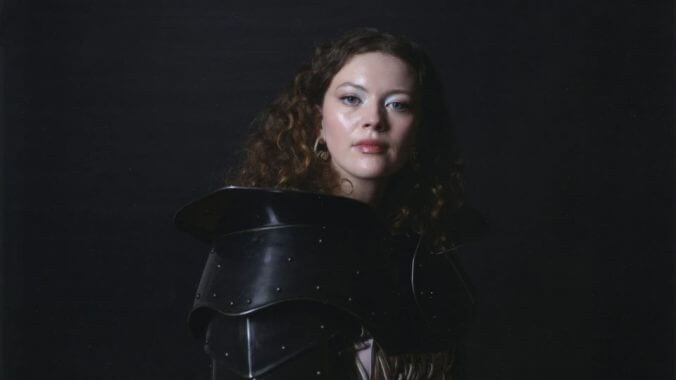The Uncountable Triumphs of Daneshevskaya
Anna Beckerman talks building a community with her peers, incorporating her day-job into the music and her debut album, Long Is The Tunnel.
Photo by Marcus Maddox
When talking to Anna Beckerman, who writes and records under the alias Daneshevskaya, I bring up Dunbar’s Number—an idea theorized by the British anthropologist Robin Dunbar. Based on his research into the size of different communities, from hunter-gatherer societies all the way to Christmas card lists, he proposed that an individual can typically maintain relationships with up to 150 people. Beyond 150, things get iffy. Of course, in our actual conversation via Zoom, neither of us know what the theory was called, and I refer to it ambiguously as the following: “I don’t remember where I read this from, or when it was, or if it’s even true. So here’s some absolute BS from me. I read something that people were only meant to know biologically 150 people in their lives. And that’s the level that we can process socially and in our heads.”
Despite my unimpressive vagueness around the half-truths I presented, Beckerman immediately bought in and agreed: “Even if that’s not true, it’s true for me. 150 is almost pushing it. Maybe 50?” A little earlier, she said,“It’s just so silly to think that all these people are listening. It doesn’t really register for me. I don’t think I really understand the idea that so many people are listening to the music.” Beckerman and I agree: Perception from more than 150 people is hard to imagine. But Beckerman’s Daneshevskaya project is already well beyond the 150-person benchmark. She signed to the New York City label Winspear, which also launched the career of indie rock breakthrough Slow Pulp (now signed to Anti- Records); she toured North America with the beloved British group Black Country, New Road. The tour ended at a packed show in New York City’s Knockdown Center, a homecoming for Beckerman. And last week, she released her seven-song debut album, Long Is The Tunnel.
Even if Beckerman can’t fathom the number of people listening to her music, she’ll likely be forced to reckon with surpassing Dunbar’s Number. And, despite her hesitations around connecting with more than 150 people, she’s incredibly community-oriented. Every part of her music-making process is centered around an interest, fascination and trust in other people. Although Beckerman’s songs often come from her own ideas, a Daneshevskaya song is a product of collaboration and community. “I like having ideas that are private–whether it’s my ideas or Maddie’s [Madeline Leshner, Daneshevskaya’s keyboardist] ideas, or Artur [Szerejko]’s, who does a lot of the guitar and the production stuff,” she says. “I like when it starts as a private thing that you just are playing with and then bringing all those elements together. But, for myself, I just start with chords, melody and lyrics. I probably pay too much attention to lyrics. Then, once I have something like that, even if it’s not a full song—even if it’s just a verse, chorus—I’ll bring it to Maddie or Artur or whoever I’m working with and have it go from there.”
Long Is The Tunnel is delicate and tender. Across its too-brief 22 minutes, Beckerman and her community weave together orchestrations of piano, violin, guitar and feather-light drums. “Chamber pop” is the most relevant genre to describe Long Is The Tunnel, but it sounds too formal, too uptight. These songs don’t adhere to rigid structure or formulas. First and foremost, they’re driven by expressiveness. The instrumentations respond to Beckerman’s crystalline voice. On some songs, like “Big Bird,” Beckerman and her peers up the intensity with rumbling guitars, making each lyric sound grave and urgent. In others, particularly the lullaby-like closer “Ice Pigeon,” Beckerman’s vocals float on top of a bed of piano, as airy as clouds in the sky.
Developing these reactive arrangements is another step where Beckerman embraces her friendships and offers to share the creative process with her community. “Once I finish a demo, I really like to feel done,” she says. “I like to give it to whoever’s working on it and not stop helping, but just stop feeling like it’s mine because I feel like it always makes it more fun to work with people. I really like to hand it over to whoever’s producing or writing the arrangement and just be like, ‘I trust you. Have fun.’ Because I think that it ends up being so much more tender and delicately crafted, and has that personal feeling if the person feels like, even if the song isn’t theirs, that step is theirs.”
-

-

-

-

-

-

-

-

-

-

-

-

-

-

-

-

-

-

-

-

-

-

-

-

-

-

-

-

-

-

-

-

-

-

-

-

-

-

-

-








































